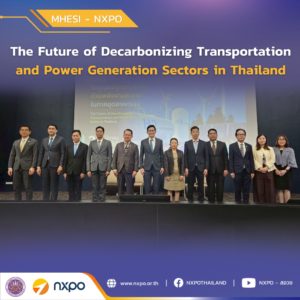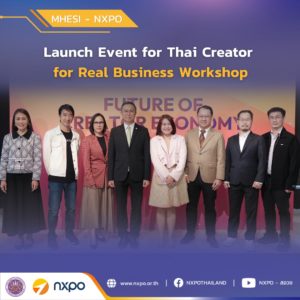At the recent NXPO Executive Board Meeting, PMU-B Acting Director Dr. Warinthorn Songkasiri made a presentation on the FY2021 performance report of the Program Management Unit for Human Resources & Institutional Development, Research and Innovation (PMU-B). The following is the summary of her presentation.

In 2021, PMU-B implemented its work through the following programs:
- National Brain Power Ecosystem. This program aims at establishing a system to produce quality manpower. The work consists of 1) post-doc, post-graduate and master’s degree programs that will produce workforce with skills and competency meeting the demand of targeted industries, 2) Work-integrated Learning (WiL) to develop job-ready graduates, 3) connect faculty members and students in nine universities under the Rajamangala University of Technology System to industry, and 4) develop an ecosystem to attract foreign talents to work in Thailand.
- Highly Skilled Workforce for Eastern Economic Corridor (EEC) and New Growth Engines. This program focuses on developing quick responses to workforce development to supply to target industries for EEC such as medical devices, aviation, shipbuilding, electronics and digital.
- Lifelong Learning and Future Skills Set. This program aims at improving knowledge, skills and competencies of the current workforce to meet the demand of industry. New reskilling and upskilling programs have been introduced, as well as GenNX Model which is a short comprehensive course aiming to produce job-ready workers for target industries. In addition, an ecosystem to foster future skills set development have been established.
- AI for All. This program aims at developing human capital and awareness in artificial intelligence (AI) at all levels – from children to educators – in order to develop a workforce with AI and machine learning skills to enhance competitiveness of Thai industries.
- Frontier and Basic Research. Since 2020, PMU-B has been supporting initiatives and projects in four sub-programs: 1) frontier research in various disciplines including biology, medicine, physical science and engineering, materials science, physics and mathematics; 2) quantum technology; 3) space technology; and 4) social science, humanities and arts (SHA) to strengthen society.
- Big Science. This program aims at establishing and managing large-scale instruments and facilities in which advanced research is conducted.
- Global Partnership. The program aims to enhance Thailand’s technological and innovation competency as well establish excellence in higher education through collaboration with international partners. Three types of fund have been set up for supporting projects in the areas of science and technology as well as social science, humanities and arts (SHA): 1) Partnership Initiative Fund 2) Network Strengthening Fund and 3) Organizational Bridging Fund. The program also promotes international research collaboration through joint research funding programs. Thailand is currently an active partner in the following bilateral and multilateral programs such as Southeast Asia-Europe Joint Funding Scheme for Research and Innovation and e-ASIA Joint Research Program.
- Crisis Response. This program aims to build capacity to respond to crises and disasters such as the COVID-19 pandemic and other emerging and re-emerging diseases.
As for the 2022 work plan, PMU-A will continue the programs that started in 2020 and 2021, focusing on brain power ecosystem, human resource development with industry, frontier research to support future industries and global partnership.









